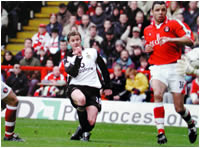


Bristol Knee Clinic

| + home | |
| + news | |
| + research | |
| + patient information | |
| + the clinic | |
| + the surgeon | |
| + sport physiotherapy | |
| + sports advice | |
| + medico legal | |
| + products | |
| + resources | |
| + contact | |
| + maps | |
| + directions | |
| + site map |
The Bristol Knee Clinic |
Arthroscopic Shoulder Surgery - Recovery and Rehabilitation
 Medication
Medication
If you do not suffer from gastric irritation, you should take anti-inflammatory tablets for two or three weeks to settle down the inflammation and swelling in the knee. The anti-inflammatory tablets should be taken after eating. If nausea, vomiting or abdominal pain develops you should reduce the dosage. If despite reducing the dosage gastric irritation continues then the tablets should be stopped and you should contact your general practitioner.
Physiotherapy
When you are comfortable and able to walk, and the nurses and physiotherapist are happy with your progress, you may be collected and taken home. This is usually 6 pm for morning cases and 8 pm for afternoon cases. The physiotherapist will visit you and discuss a program of rehabilitation and an exercise programme. After discharge from hospital the progress is variable, so do not worry if your progress is a little slow at this stage. After several weeks resisted exercises and light weight training may be undertaken if desired; this is beneficial. Check with your Surgeon or physiotherapist prior to starting such exercise.
Shoulder Physiotherapy:
Physiotherapy of the shoulder is a specialised area and usually requires the supervision of a physiotherapist. In the presence of a shoulder dislocation, subluxation, rotator cuff tendonitis, calcific tendonitis or biceps tendonitis pain relief may be achieved by the use of ultrasound, faradism or laser treatment. Strengthening exercises should concentrate on the muscles which pull the arm down to the side and those which twist the arm. Activities involving moving the arm out away from the side generally only cause more shoulder inflammation and pain.The muscles holding the shoulder down are strengthened by squeezing the elbow in to the side over a pillow or against a resistance band available from the physiotherapist. The contraction should be held for 10 seconds and then the shoulder relaxed for 10 seconds. The exercise should be repeated perhaps 10-15 times. The internal rotators are strengthened by holding the elbow in to the side whilst twisting the hand in across the stomach against the resistance of a pillow, door post or resistance band. The external rotators are strengthened by holding the elbow in the waist whilst twisting the hand out to the side. These exercises should be repeated in the same way. Exercise should be undertaken for perhaps 30 minutes 3 times each day. After perhaps 2-6 weeks when any pain has settled, the resistance can be increased and weight training started. Initially for the first 2-4 weeks of weight training only very light weights should be used.
+ Find out more about Physiotherapy
Results and Complications
Arthroscopic shoulder surgery is one of the most common, most successful and safest orthopaedic surgical procedures undertaken. Aarthroscopic subacromial decompression is very successful in relieving the pain of rotator cuff tendonitis and allowing a return to daily activities and sports. The recovery is usually rapid within 6-12 weeks. The incidence of any post-operative complication is low and usually less than in 1% of cases. Possible complications include anaesthetic risks, infection, venous thrombosis, stiffness, further pain and a recurrent tear of the rotator cuff tendon or further shoulder dislocations. Infection may present by the shoulder becoming hot, swollen, throbbing and painful after 1-2 days. Venous thrombosis presents with a swollen tender calf muscle, a swollen foot, or intermittent pain in the chest on deep breathing. If any of these or any other complications arise inform your general practitioner immediately. Where degenerative changes are present in the knee the improvement may be limited and the symptoms may return because of progressive degeneration over the course of time. If any of these or any other complications arise, inform your General Practitioner immediately.
Return to Work / Sport
 If your job is sedentary and mostly sitting you may wish to return after only a few days. If your job is physically demanding and requires lifting, your return to work may take up to 6 weeks.
Driving can usually be performed after 2 to 5 days providing that the shoulder is pain free and you are able to control the car. Light weight training may be undertaken after several weeks. Lifting weights above the head or racket sports may take a little longer. Exercises and gym training will speed up the rehabilitation and should be performed prior to undertaking more vigorous sports.
If your job is sedentary and mostly sitting you may wish to return after only a few days. If your job is physically demanding and requires lifting, your return to work may take up to 6 weeks.
Driving can usually be performed after 2 to 5 days providing that the shoulder is pain free and you are able to control the car. Light weight training may be undertaken after several weeks. Lifting weights above the head or racket sports may take a little longer. Exercises and gym training will speed up the rehabilitation and should be performed prior to undertaking more vigorous sports.
Follow-up Appointments
The first follow up appointment is usually arranged for 2-3 weeks after surgery. Physiotherapy should be started soon after surgery, usually 3-5 days later and continued 2-3 times a week for 2-6 weeks depending on the individual patient's progress.
< BACK to Surgery | NEXT: About Mr David P Johnson >
Related Links..
+ How to make an appointment
+ Arthroscopic Shoulder Surgery - see all links
+ Patient Information Home
+ See the clinic
+ More about Mr Johnson
+ top
© The Bristol Orthopaedics and Sports Injuries Clinic 2003. The Bristol Knee Clinic is a trading name of the Bristol Orthopaedic Clinic Ltd. privacy / copyright | contact | Powered By Create Medical



